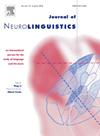N400 signatures of presupposition and assertion correlate with pragmatic mismatches, not with epistemic vigilance
IF 1.2
3区 心理学
Q2 LINGUISTICS
引用次数: 0
Abstract
This study investigates the N400 component, first identified in response to the presupposition of unshared information compared to the presupposition of shared information and the assertion of unshared information. Two hypotheses were tested: (i) the N400 only represents a pragmatic mismatch due to a less predicted informational packaging associated with some content, or (ii) it reflects variations in critical attention under different packaging conditions. Our findings support the first hypothesis. The N400 correlates with pragmatic mismatches between the linguistic encoding of content and its previous cognitive status, namely (1a) presupposition vs assertion of unshared information and (1b) presupposition of shared vs unshared information; and (2a) assertion vs presupposition of shared information and (2b) assertion of shared vs unshared information. The N400 is absent in equally matching conditions, i.e., the presupposition of shared content vs the assertion of unshared content (both matching) and the presupposition of unshared content vs the assertion of shared content (both mismatching). These conclusions offer insights into one of the key ERP components of language processing.
假设和断言的N400特征与语用错配相关,而与认知警惕无关
本研究调查了N400成分,首先确定了对非共享信息的预设的响应,将其与共享信息的预设和非共享信息的断言进行了比较。测试了两个假设:(i) N400仅代表由于与某些内容相关的较少预测的信息包装而导致的语用不匹配,或者(ii)它反映了不同包装条件下关键注意力的变化。我们的发现支持了第一个假设。N400与内容的语言编码与其先前认知状态之间的语用不匹配有关,即:(1a)预设与非共享信息的断言,(1b)预设与非共享信息;(2a)共享信息的断言与预设(2b)共享信息与非共享信息的断言。在同样匹配的条件下,即共享内容的预设与非共享内容的断言(两者都匹配)以及非共享内容的预设与共享内容的断言(两者都不匹配),N400是不存在的。这些结论为语言处理的关键ERP组成部分之一提供了见解。
本文章由计算机程序翻译,如有差异,请以英文原文为准。
求助全文
约1分钟内获得全文
求助全文
来源期刊

Journal of Neurolinguistics
医学-神经科学
CiteScore
3.90
自引率
5.00%
发文量
49
审稿时长
17.2 weeks
期刊介绍:
The Journal of Neurolinguistics is an international forum for the integration of the neurosciences and language sciences. JNL provides for rapid publication of novel, peer-reviewed research into the interaction between language, communication and brain processes. The focus is on rigorous studies of an empirical or theoretical nature and which make an original contribution to our knowledge about the involvement of the nervous system in communication and its breakdowns. Contributions from neurology, communication disorders, linguistics, neuropsychology and cognitive science in general are welcome. Published articles will typically address issues relating some aspect of language or speech function to its neurological substrates with clear theoretical import. Interdisciplinary work on any aspect of the biological foundations of language and its disorders resulting from brain damage is encouraged. Studies of normal subjects, with clear reference to brain functions, are appropriate. Group-studies on well defined samples and case studies with well documented lesion or nervous system dysfunction are acceptable. The journal is open to empirical reports and review articles. Special issues on aspects of the relation between language and the structure and function of the nervous system are also welcome.
 求助内容:
求助内容: 应助结果提醒方式:
应助结果提醒方式:


